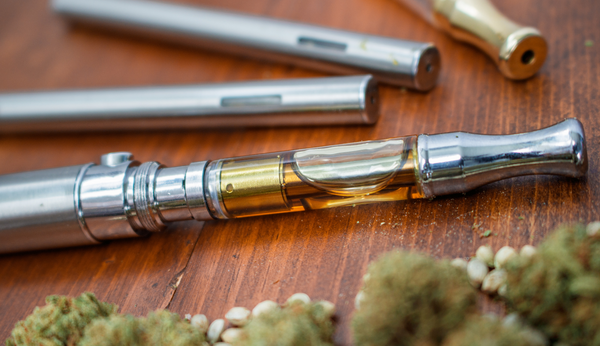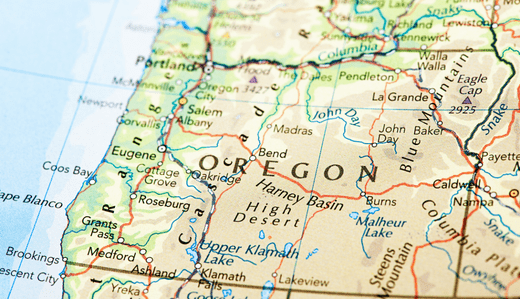Your Cart is Empty
FREE SHIPPING ON ALL ORDERS $75+
Hemp laws are varied across the U.S. and the legality of hemp-derived cannabinoids can be confusing. Is Delta-8-THC legal in Oregon? And if so, where can you find high-quality Delta-8 products in the state?
Luckily, Delta 8 is legal in Oregon. The state was one of the first to regulate, not ban, Delta-8 and other hemp THC products. New regulations identify Delta-8-THC products as "adult use " products, which means they may only be purchased by those aged 21 and older.
Check out Oregon’s Delta-8 laws below:
Disclaimer: We’re always working to stay informed on the latest Delta-8 laws and research. However, state laws are subject to change and we advise that you do your own research to verify the information you find in this article. This is not intended as legal advice.
Table of Contents
Delta-8-THC and Federal Laws
Oregon Delta-8-THC Laws
Delta-8-THC Possession Limits in Oregon
Is Delta-9-THC Legal in Oregon?
Where to Buy Delta-8 in Oregon
Do You Have to Be 21 to Buy Delta-8?
Is Delta-8 Legal in All 50 States?
Resources
Since the 2018 Farm Bill became law, Oregon has updated their hemp laws to broadly legalize hemp and its constituents, like CBD.
In fact, the state makes a careful differentiation between “hemp” and “marijuana” products. In Oregon, hemp-derived cannabinoid products are legal in all forms, including edibles and other consumables.
Oregon’s lax stance on hemp and Delta-8 was originally a stark contrast to the laws laid out by many nearby states, like Nevada, Idaho, and Montana, where Delta-8 is prohibited.
More recently, Oregon solidified their stance on Delta-8 when they became one of few states who have opted to regulate Delta-8 sales in the state. In July of 2021, the state passed HB3000, a bill that clarifies that all products that contain more than 0.5 milligrams of any form of THC as an "Adult Use Cannabis Item."
Under these new rules, Delta-8-THC products derived from hemp are legal, but cannot be sold to anyone under the age of 21 years old.
Here are some excerpts from relevant legislation:
OAR - CHAPTER 603 - DIVISION 48 - INDUSTRIAL HEMP
OAR 603-048-0010 – Definitions
(15) “Hemp Item” has the meaning provided in OAR 603-048-2310.
(16) “Industrial hemp”:
(a) Means all non-seed parts and varieties of the Cannabis plant, whether growing or not, that contain an average tetrahydrocannabinol concentration that does not exceed 0.3 percent on a dry weight basis.
(b) Means any Cannabis seed:
(A) That is part of a crop;
(B) That is retained by a grower for future planting;
(C) That is agricultural hemp seed;
(D) That is for processing into or for use as agricultural hemp seed; or
(E) That has been processed in a manner or to an extent that the Cannabis seed is incapable of germination.
(c) Does not mean:
(A) Industrial hemp commodities or products; or
(B) Marijuana, as that is defined in ORS 475B.015.
475B.015 Definitions
(17)(a) “Marijuana” means the plant Cannabis family Cannabaceae, any part of the plant Cannabis family Cannabaceae and marijuana seeds.
(b) “Marijuana” does not include:
(A) Industrial hemp, as defined in ORS 571.269; or
(B) Prescription drugs, as that term is defined in ORS 689.005, including those containing one or more cannabinoids, that are approved by the United States Food and Drug Administration and dispensed by a pharmacy, as defined in ORS 689.005.
OAR 603-048-2310.– Definitions:
(16) “Cannabinoid hemp product”
(a) Means a hemp edible or any other product intended for human consumption including a hemp topical or hemp transdermal patch, that contains cannabinoids from industrial hemp or the dried leaves or flowers of hemp; or
(b) Usable hemp, hemp extracts and hemp concentrates that have been combined with an added substance.
(c) Cannabinoid hemp product does not include usable hemp by itself, hemp stalk by itself, a hemp concentrate or extract by itself, hemp seed incapable of germination by itself, or other products derived only from hemp seeds incapable of germination that may include other non-hemp ingredients.
(d) For sampling and testing purposes is equivalent to a cannabinoid product as that is defined in OAR 333-007-0310.
(17) “Hemp concentrate or extract”
(a) Means a substance obtained by separating cannabinoids from industrial hemp leaves, flowers, or stalk by a mechanical, chemical or other process.
(b) For sampling and testing purposes is equivalent to a cannabinoid concentrate or edible as that is defined in OAR 333-007-0310.
(19) “Hemp item”
(a) Means usable hemp, hemp stalk, a hemp cannabinoid product, or a hemp concentrate or extract.
(b) For sampling and testing purposes is equivalent to a marijuana item as that is defined in OAR 333-007-0310.
Public Health Division – Chapter 333
333-007-0310 – Definitions
(38) “Marijuana”
(a) “Marijuana” means the plant Cannabis family Cannabaceae, any part of the plant Cannabis family Cannabaceae and the seeds of the plant Cannabis family Cannabaceae.
(b) “Marijuana” does not include industrial hemp, as defined in ORS 571.300.
(39) “Marijuana item” means marijuana, usable marijuana, a cannabinoid product or a cannabinoid concentrate or extract.
(38) “THC” means tetrahydrocannabinol and has the same Chemical Abstracts Service Number as delta-9 THC.
 Delta 8 THC Possession Limits in Oregon
Delta 8 THC Possession Limits in OregonOregon does not define any possession limits for hemp or hemp products. Therefore, there are no possession limits defined for Delta-8-THC.
Still, Delta-8 could be easily confused for Delta-9 THC by authorities without proper documentation and lab testing.
Basic lab testing checks only for tetrahydrocannabinol, meaning that extensive lab tests are needed to differentiate between Delta-8 content and Delta-9 content when proof of legal possession is needed.
Yes. The Oregon Medical Marijuana Act passed into law in 1998 and the state became one of the first in the country to legalize the use of medical cannabis for qualifying patients. In 2014, voters approved Measure 91, which legalized the sale, possession, and use of recreational marijuana.

Oregon has very loose regulations regarding how hemp and hemp products can be sold, and some nearby states (like Washington) also allow Delta-8 production. That means that you may find a variety of Delta-8 products in stores in the Oregon area.
Still, it’s advisable to proceed with caution when choosing a Delta-8 distributor. While you can likely find various hemp products in local stores, there may be benefits to buying Delta-8 online. One reason is that you can buy directly from a brand or manufacturer, instead of purchasing through a third-party vendor that may not fully understand Delta-8 effects and uses or the laws surrounding Delta-8 products.
At Vida Optima, our Delta-8-THC products comply with all parameters of the Hemp Farming Act of 2018. We can also help answer questions about Delta-8 before you buy, or you can read our “What is Delta-8-THC?” guide to learn everything you need to know.
Yes! Oregon considers Delta-8-THC products to be "Adult Use Cannabis Products" that cannot be sold to consumers under the age of 21, except to medical marijuana card holders in a state-licensed dispensary.
Delta-8-THC is currently federally legal under the context of the Hemp Farming Act of 2018, but each state has the right to determine their own stance on tetrahydrocannabinols derived from hemp. Delta-8-THC is legal in Oregon according to state law, but you should read more about Delta-8 laws by state to determine the legality in other areas.
Yes, Delta-8 THC is legal in Oregon. As of current regulations, Delta-8 THC is legal according to Oregon state law. Oregon has legalized all derivatives, cannabinoids, and isomers of hemp.
Yes, Delta-9 THC is legal in Oregon. Residents can purchase Delta-9 products from licensed dispensaries as Oregon has fully legalized both medical and recreational marijuana.
Yes, you can legally travel with Delta-8 as long as the Delta-9 THC content is less than 0.3% and it is legal in both the departure and destination states, according to TSA rules.
Delta-8 THC is banned in several states including Alaska, Colorado, Delaware, Hawaii, Idaho, Massachusetts, Mississippi, and Montana.
While Delta-8 is legal in Oregon, it is regulated by the Oregon Liquor and Cannabis Commission (OLCC). All products must comply with OLCC regulations regarding testing, labeling, and sales.
Yes, Delta-10 THC is also legal in Oregon under the same regulations that apply to Delta-8 and other hemp-derived cannabinoids.
Comments will be approved before showing up.



